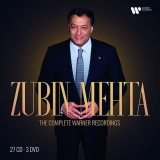 Zubin Mehta. Complete Warner Recordings; Ravi Shankar: Sitarkonzert Nr. 2; Prokofiev: Peter und der Wolf; Saint Saëns: Karneval der Tiere + Symphonie Nr. 3; Khachaturian: Violinkonzert; Tchaikovsky: Violinkonzert op. 35; Meditation; Mahler: Symphonien Nr. 1, 2, 5, 6; Bruch: Violinkonzert Nr. 2; Schottische Fantasie op. 46; Shostakovich: Violinkonzert Nr. 1; Glazunov: Violinkonzert op. 82; Holst: The Planets op. 32; Sibelius: Symphonie Nr. 2 + Finlandia op. 26; Stravinsky: Le Sacre du Printemps + Symphonie in 3 Sätzen; Gershwin: Porgy & Bess (Ausz.) + An American in Paris + Cuban Overture; Castelnuovo-Tedesco: Violinkonzert Nr. 2; Ben-Haim: Violinkonzert; Paganini: Violinkonzert Nr. 1; Saint-Saëns: Introduktion & Rondo capriccioso op. 28; Havanaise op. 83 / Waxman: Carmen-Fantasie; Tchaikovsky: Capriccio Italien op. 45 + Schwanensee-Suite op. 20 + Slawischer Marsch op. 31 + 1812-Ouvertüre; Orff: Carmina Burana; Berlioz: Symphonie fantastique + Le Carnaval romain op. 9 + Béatrice et Bénédict-Ouvertüre; Franck: Symphonie; Die 3 Tenöre in Concert 1994; Verdi: Aida + La Traviata; Puccini: Tosca; Perlman in Russia - Film of the tour; José Carreras, Placido Domingo, Luciano Pavarotti, Birgit Nilsson, Franco Corelli, Grace Bumbry, Catherine Malfitano, Ruggero Raimondi, Eteri Gvazava, Roberta Alexander, José Cura, Sumi Jo, Florence Quivar, Nancy Gustafson, Jochen Kowalski, Rolando Panerai, Itzhak Perlman, Ravi Shankar, Maxim Vengerov, Daniel Chorzempa, London Philharmonic Choir, Prague Philharmonic Choir, Orchestra Sinfonica di Roma della RAI, Orchestra Sinfonica Nazionale della RAI, London Symphony Orchestra, Katia & Marielle Labèque, Israel Philharmonic Orchestra, New York Philharmonic Orchestra, London Philharmonic Orchestra, Berliner Philharmoniker, Los Angeles Philharmonic Orchestra, Zubin Mehta; 27 CDs + 3 DVDs Warner Classics 0190295221324; Aufnahmen 1967-2000; Veröffentlichung 10/2020 - Rezension von Remy Franck
Zubin Mehta. Complete Warner Recordings; Ravi Shankar: Sitarkonzert Nr. 2; Prokofiev: Peter und der Wolf; Saint Saëns: Karneval der Tiere + Symphonie Nr. 3; Khachaturian: Violinkonzert; Tchaikovsky: Violinkonzert op. 35; Meditation; Mahler: Symphonien Nr. 1, 2, 5, 6; Bruch: Violinkonzert Nr. 2; Schottische Fantasie op. 46; Shostakovich: Violinkonzert Nr. 1; Glazunov: Violinkonzert op. 82; Holst: The Planets op. 32; Sibelius: Symphonie Nr. 2 + Finlandia op. 26; Stravinsky: Le Sacre du Printemps + Symphonie in 3 Sätzen; Gershwin: Porgy & Bess (Ausz.) + An American in Paris + Cuban Overture; Castelnuovo-Tedesco: Violinkonzert Nr. 2; Ben-Haim: Violinkonzert; Paganini: Violinkonzert Nr. 1; Saint-Saëns: Introduktion & Rondo capriccioso op. 28; Havanaise op. 83 / Waxman: Carmen-Fantasie; Tchaikovsky: Capriccio Italien op. 45 + Schwanensee-Suite op. 20 + Slawischer Marsch op. 31 + 1812-Ouvertüre; Orff: Carmina Burana; Berlioz: Symphonie fantastique + Le Carnaval romain op. 9 + Béatrice et Bénédict-Ouvertüre; Franck: Symphonie; Die 3 Tenöre in Concert 1994; Verdi: Aida + La Traviata; Puccini: Tosca; Perlman in Russia - Film of the tour; José Carreras, Placido Domingo, Luciano Pavarotti, Birgit Nilsson, Franco Corelli, Grace Bumbry, Catherine Malfitano, Ruggero Raimondi, Eteri Gvazava, Roberta Alexander, José Cura, Sumi Jo, Florence Quivar, Nancy Gustafson, Jochen Kowalski, Rolando Panerai, Itzhak Perlman, Ravi Shankar, Maxim Vengerov, Daniel Chorzempa, London Philharmonic Choir, Prague Philharmonic Choir, Orchestra Sinfonica di Roma della RAI, Orchestra Sinfonica Nazionale della RAI, London Symphony Orchestra, Katia & Marielle Labèque, Israel Philharmonic Orchestra, New York Philharmonic Orchestra, London Philharmonic Orchestra, Berliner Philharmoniker, Los Angeles Philharmonic Orchestra, Zubin Mehta; 27 CDs + 3 DVDs Warner Classics 0190295221324; Aufnahmen 1967-2000; Veröffentlichung 10/2020 - Rezension von Remy Franck

Zubin Mehta hat enorm viel für viele verschiedene Labels aufgenommen. Er ist ein Hans-Dampf-in allen-Gassen, gut für ein gewisses Repertoire, das Glanz und Pracht braucht, aber die Musik besteht halt aus mehr als aus spektakulären Events und Show. Jetzt ist die Box Zubin Mehta The Complete Warner Recordings herausgekommen. Sie enthält Gutes und weniger Gutes, so wie das bei diesem Dirigenten eben die Regel ist. So wurde bei der aufwändig inszenierten Traviata-Verfilmung aus Paris, mit Gvazava und Cura, viel Gewicht aufs Bild gelegt und nicht genügend Wert auf die Musik. Schwaches Dirigat, schwache Sängerleistungen! Von Verdis Situations- und Gefühlsbeschreibungen kommt da so gut wie nichts herüber.
Das Mammut-Spektakel der Drei Tenöre im Dodger-Stadion von Los Angeles im Jahre 1994 war letztlich nur ein Remake von 1990. Ob es auch schöner, atmosphärisch so gelungen war wie das Konzert in den Caracalla-Thermen in Rom wage ich zu bezweifeln. Auf jeden Fall wurde nicht so gut gesungen. Placido Domingo war zwar in blendender Form, hatte einen völlig näselfreien Tag und wirkte auch musikalisch am sichersten, aber dafür war Pavarotti in einer eher desolaten Verfassung. Auf der CD hört man es deutlich: er quetscht und trickst sich durch jede Arie und jedes Lied. José Carreras hat die am wenigsten attraktiven Programmnummern zu singen, aber er tut es ehrbar.
Auch Mehtas Version der Carmina Burana mit dem London Philharmonic ist schäbig, pathetisch und aufgeblasen. Die Mahler-Interpretationen sind allesamt spektakulär in ihrer Klangentfaltung. Manchmal dringt Mehta doch tiefer die Musik ein, als man für möglich hielt, aber zu den wirklich großen Mahler-Dirigenten ist er nicht zu zählen.
Wenig attraktiv, weil konzeptlos ist Mehtas Dirigat in der Franck-Symphonie. Die schnelleren Teile wirken eher sportlich und klanglich aufgebauscht. Für die Saint-Saëns-Symphonie hat der Dirigent nur triviale Zusammenhanglosigkeit anzubieten. Was allein zu zählen scheint, ist Klangwirkung.
Auch in vielen anderen Werken in dieser Sammlung geht es vor allem um Klang und Brillanz. Poesie darf man etwa in der Symphonie Fantastique keine suchen, auch nicht bei Tchaikovsky. Wer mit Klangrausch zufrieden ist, wird in diesen Aufnahmen nicht schlecht bedient. Aber das ist nun halt Mehta. Ausnahmen bestätigen freilich die Regel.
Zubin Mehta made a lot of recordings for many different labels. He is a jack-of-all-trades, good for a certain repertoire that needs glamour and splendour, but the real music is more than spectacular events and shows. Now the box with his Complete Warner Recordings has been released. It contains good and less good performances, as is the rule with this conductor. For example, in the elaborately staged Traviata film adaptation from Paris, with Gvazava and Cura, a lot of efforts were invested in the image and not enough in the music. Weak conducting, weak singing! Almost nothing of Verdi’s atmospheres and feelings comes across.
The huge event of the Three Tenors in the Dodger Stadium in Los Angeles in 1994 was ultimately only a remake from 1990. Whether it was as beautiful and atmospherically successful as the concert in Rome, I dare to doubt. In any case, the singing was not as good. Placido Domingo was in dazzling form, had a completely no-nose day and also seemed musically to be the safest of the three. But Pavarotti was in a rather desolate condition. You can hear it clearly on the CD: he squeezed and tricked his way through every aria and song. José Carreras has the least attractive programme numbers to sing, but he does it honourably.
Mehta’s version of Carmina Burana with the London Philharmonic is also shabby, pathetic and pompous. The Mahler interpretations have a spectacular and brilliant sound. Sometimes Mehta does penetrate the music more deeply than expected, but he is not one of the truly great Mahler conductors.
Mehta’s conducting in the Franck Symphony is not very attractive because it is without concept. The faster parts seem rather sporty and exaggerated. For the Saint-Saëns-Symphony the conductor has only trivial incoherence to offer. Again he is looking only for the effect of a spectacular sound, as he does in many other works in this collection too. Poetry, for example, is not to be found in the Symphonie Fantastique, not even in Tchaikovsky. Those who are satisfied with a grandiose sound will not be badly served in these recordings. But that is just Mehta. Of course, exceptions confirm the rule.























